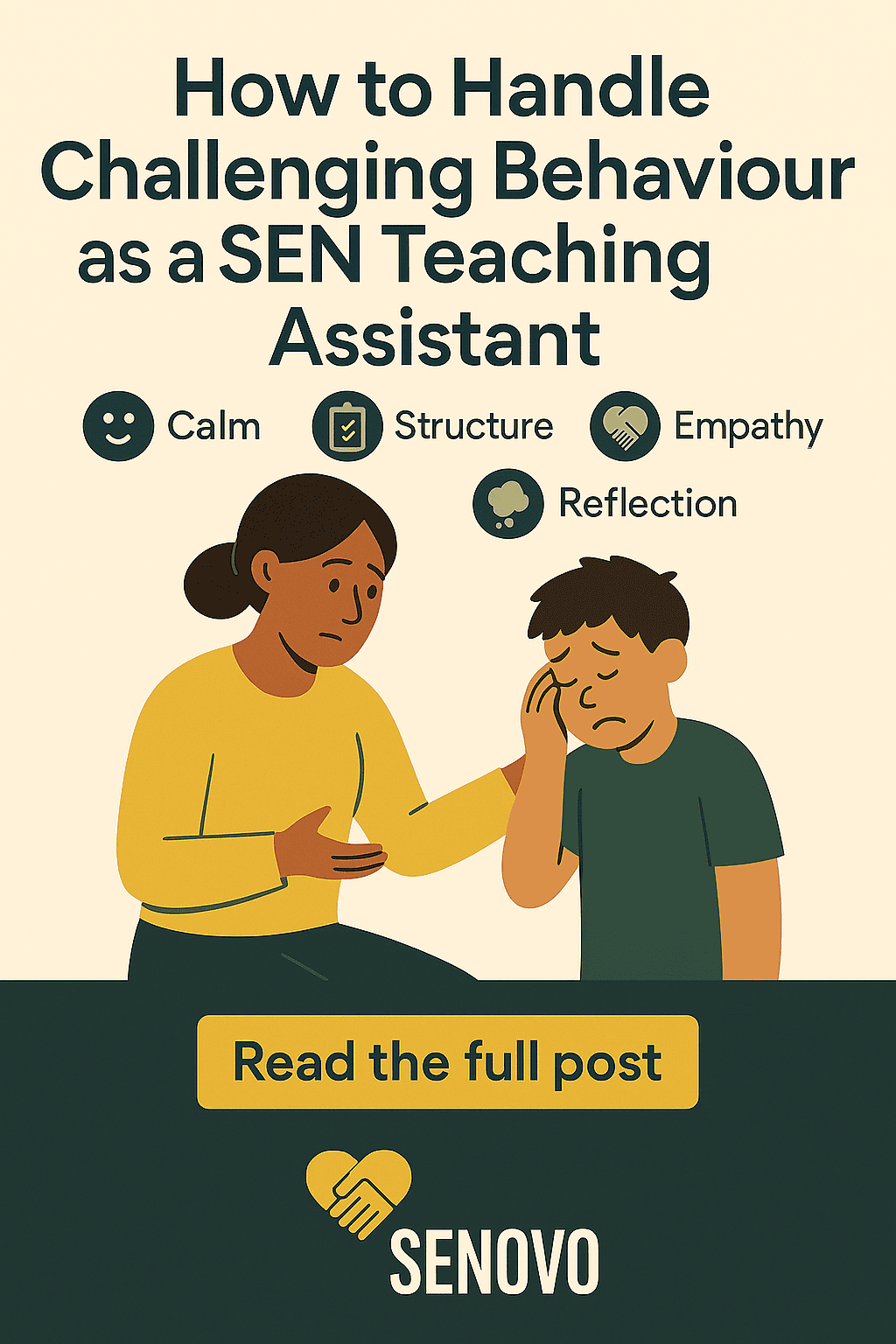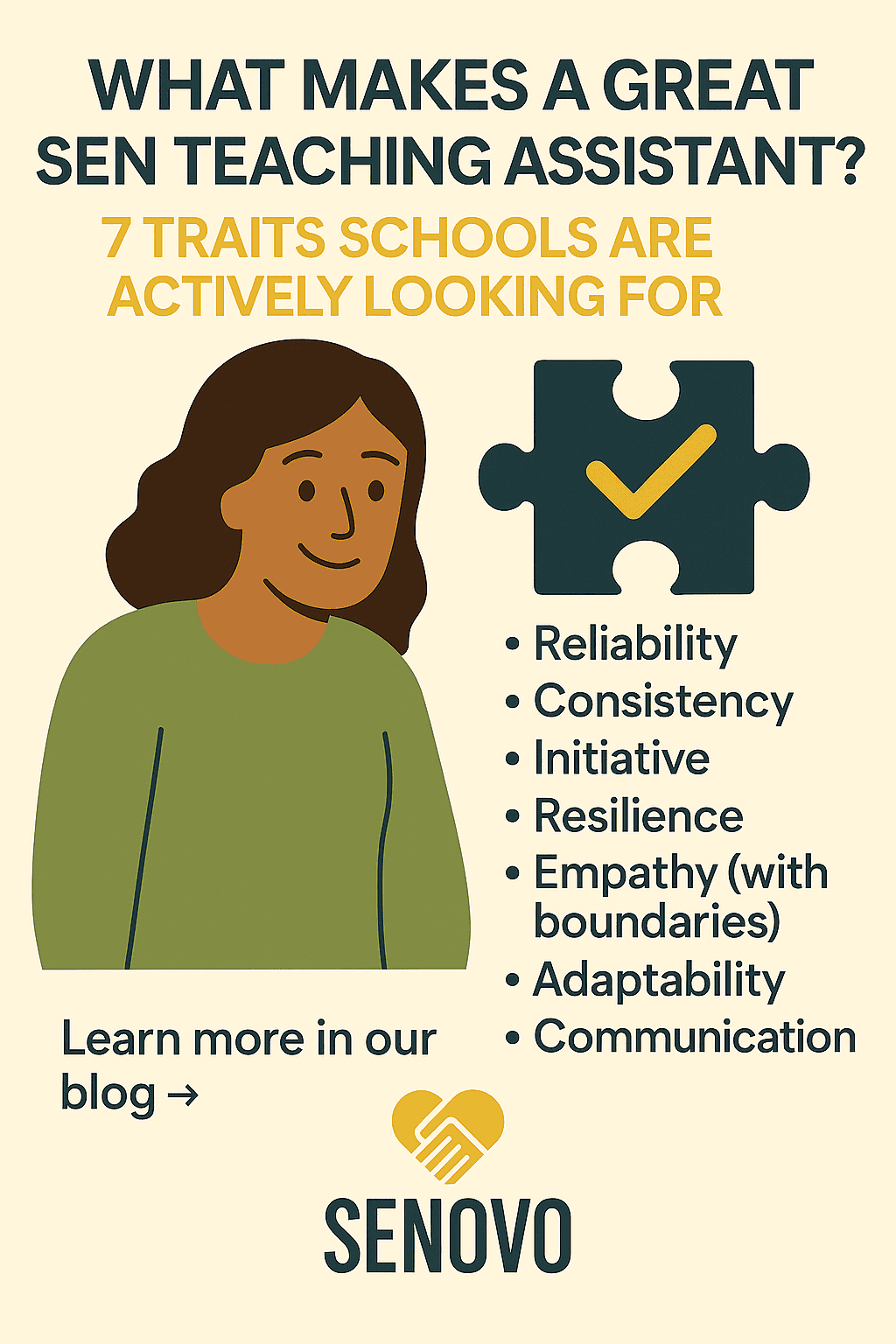Working in SEN means no two days are the same — and neither are the behaviours you’ll encounter.
Whether it’s refusal to follow instructions, verbal outbursts, or emotional dysregulation, one thing’s for sure: your response matters more than the behaviour itself.
Here’s how experienced SEN TAs handle challenging behaviour — without shouting, panicking, or escalating the situation further.
🚨 1. Stay Calm, Always
Why? Because the child is dysregulated — and they need you to be the calm in the chaos.
🧩 Try this:
Lower your voice. Slow your breathing. Create physical space if needed.
Avoid rapid instructions — stick to short, clear directions.
Instead of:
“Sit down right now or you’re in trouble!”Try:“Let’s take 2 minutes. I’ll wait with you.”

🧠 2. Understand the Trigger
Behaviour is communication. A meltdown or refusal usually means something else is going on:
Sensory overload
Unmet emotional need
Fear of failure
Lack of structure
Your job? Spot the pattern.
🧩 Tip:
Keep simple behaviour logs. Over time, you’ll identify what sets the behaviour off — and how to reduce it.
🗣️ 3. Use De-Escalation Language
Words either fuel the fire or defuse it.
Avoid: sarcasm, threats, or raising your voice
Use: neutral tone, validation, and redirection
✅ Example phrases that work:
“I can see you’re finding this hard — let’s take a break.”
“You’re safe. I’m here to help.”
“When you’re ready, we’ll figure this out together.”
🧰 4. Stick to Agreed Strategies
Every child has different needs — and often a behaviour plan. Following it exactly builds consistency, predictability, and trust.
🧩 If the plan says ignore low-level swearing and redirect — don’t get into a shouting match.
Be the adult who sticks to the script.
🤝 5. Reflect — Don't Take It Personally
You’re human. But if a child lashes out, it’s not about you.
Take time to reflect afterwards:
What worked?
What didn’t?
How can we do it better next time?
And always speak to your teacher or SENCO. You’re part of a team.
🔒 Bonus: Boundaries Are Your Best Friend
Being compassionate doesn’t mean being passive. Boundaries help everyone feel safe — including you.
“It’s okay to be angry. It’s not okay to throw things. Let’s find a better way to let it out.”
🎯 Final Thought
Challenging behaviour is never personal — but how you respond makes a huge difference.
The best SEN TAs stay calm, think ahead, and act with empathy and structure. That’s what schools — and pupils — are looking for.
Would you like help preparing for an interview where behaviour questions might come up? Or want support dealing with something you’ve faced recently?
Senovo is here to support you. Just get in touch.
Previous Blog Post

What Makes a Great SEN Teaching Assistant? 7 Traits Schools Are Actively Looking For
If you’re applying for SEN Teaching Assistant (TA) roles, you may wonder: What exactly are schools looking for? What makes one TA stand out from another when the job title and responsibilities often sound the same?
From speaking with hundreds of SENCOs and school leaders, here’s what we’ve learned: it's not just about experience — it's about mindset, consistency, and the right behaviours.
Here are 7 key traits that make a great SEN TA — and how you can showcase them on your CV and in interviews.
